Guest Artists Winter Weekend 2022
Roberto Bagnoli 💖 International Dances
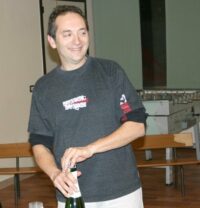
Roberto is a master teacher of international folkdance with a specialization in traditional and modern Israeli, Balkan, Italian and Contra dances.
He discovered his love for Israeli dance many years ago in Rome when he started dancing with the Jewish community there, and then began performing with “Sasson Ve Simcha” and teaching classes at the Jewish Community Center. He subsequently studied Israeli dance in workshops throughout Europe, the United States, and in Israel under the guidance of various choreographers and teachers.
In 2000 he co-directed and choreographed the performance “Mazal Tov” and a few years later, founded the association “Folk Atelier Reggio Emilia”, dedicated to preserving and promoting folk dance and other folk arts. The association is responsible for dance classes throughout Italy, and Roberto himself teaches weekly classes in Reggio Emilia, Modena, Cremona, Crema, Piacenza and Imola
He is the director of two highly successful camps in Italy each year: Balkanot, the first ever Israeli and Balkan dance camp, which takes place every January, and Camp Yofi, Israeli dance, which takes place in July.
Roberto conducts workshops and seminars throughout Europe, Canada, Japan, Hong Kong, Singapore, Taiwan and the United States.
Željko Jergan 💖 Croatian Dances
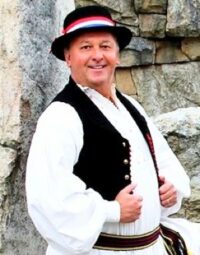 Željko is a world-renowned Croatian dance instructor, researcher, performer and choreographer. Currently based in Pennsylvania, Željko teaches at workshops, camps and festivals throughout the United States, Canada, Europe and Asia.
Željko is a world-renowned Croatian dance instructor, researcher, performer and choreographer. Currently based in Pennsylvania, Željko teaches at workshops, camps and festivals throughout the United States, Canada, Europe and Asia.
Željko was inspired at the age of 7 to begin dancing after attending a theater performance of Croatia’s state ensemble “LADO” with his father. The costumes and singing had an immediate effect on him from the moment the curtain opened and he knew he wanted to join the group. At the age of 18 that dream became a reality when he became a member of the prestigious ensemble LADO. He now shares his knowledge of Croatian music, dancing, costumes and traditions with people of all ages through teaching.
Jaap Leegwater & Jan Wollring 💖 Bulgarian Dances
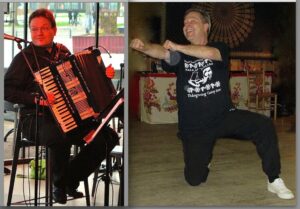 Jaap is known worldwide for his fun teaching and having introduced dances including Karamfil, Dobrudžanska Pandela, and Mari Marijko. He began his dance career in the Netherlands, where he earned one of his degrees in international folk dance, specializing in Bulgarian folk dance and choreography. Jaap studied at the State Choreographer’s school in Sofia and Plovdiv, living there for two years; he regularly returns to Bulgaria to update his studies and make new recordings.
Jaap is known worldwide for his fun teaching and having introduced dances including Karamfil, Dobrudžanska Pandela, and Mari Marijko. He began his dance career in the Netherlands, where he earned one of his degrees in international folk dance, specializing in Bulgarian folk dance and choreography. Jaap studied at the State Choreographer’s school in Sofia and Plovdiv, living there for two years; he regularly returns to Bulgaria to update his studies and make new recordings.
Accompanying Jaap will be accordionist Jan Wollring. Jan was the regular accompanist of Bulgarian singer Galina Durmushliyska during the years she lived in the Netherlands. Jan’s music and his band also appear on several of Jaap’s recordings and teaching CD’s.
Tijn Boissevain, is in charge of the team’s technical support, sound and video. He is also a passionate Balkan dancer himself, and professional in the ICT business. A perfect combination to assist Jaap and Jan, and to make sure everything looks and sounds right.
Andy Taylor-Blenis 💖 International Dances
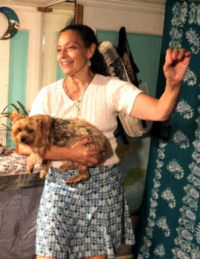 Andy started International Folk dancing at a young age under the guidance of her parents, Marianne and Conny Taylor, cofounders of the Folk Arts Center of NE. Her mother, Marianne Taylor, was on Staff at Stockton many times.
Andy started International Folk dancing at a young age under the guidance of her parents, Marianne and Conny Taylor, cofounders of the Folk Arts Center of NE. Her mother, Marianne Taylor, was on Staff at Stockton many times.
Andy was certified in Scottish Country Dance at 17 and graduated with a BFA in dance and a minor in Social Anthropology. She continues to teach International Dance in schools through Dance Collective/ Mass Movement & BalletRox through residencies. Andy is the artistic director of Mladost Folk Ensemble, which she founded upon the death of her father in 2006 and continues in the spirit of her parents’ work. She recorded and produced a CD of Austrian jodels printed in a book by Werner von Trapp and produced by Conny Taylor.
Since the beginning of the pandemic, Andy’s generous students have stepped up and assisted her to get on Zoom. She has continued as artistic director to the Wheaton College Dance Company on Zoom. In addition, she teaches her youth performing group, Mladost Folk Ensemble, both virtually and returning to in-person. They have produced two video collages.
Andy has continued to teach both her Modern 55+ and Modern/Jazz classes online and has begun to teach select classes in-person. She has taught Focus on Form virtual classes for the RSCDS NoVA and Boston Branches. These classes help dancers to get ready for the physical demands of in-person dances. The silver lining for Andy and the Tuesday Community Dance is that they have been welcoming participants from all over the world, just as Stockton and so many other festivals and local dances have done.
Music Teachers
Polly Tapia Ferber 💖 Drumming
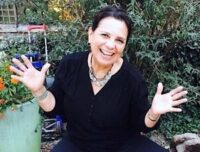
If you’re curious about rhythm, especially the complex rhythms of international folk dance music, join Polly to learn how to hear, count, and play a variety of dance patterns. Use any hand drum available: a doumbek, a djembe, an oatmeal box, a coffee can… Your feet know what to do, invite your hands and brain to come along!
Polly is a music educator, performer, and recording artist who specializes in hand percussion from the Balkans, the Middle East, Turkey, North Africa, and Spanish Andalucia. She is noted for her melodic style of playing on several percussion instruments including the doumbek, frame drums, the Middle Eastern tambourine, and Spanish wooden box-drum (cajon). She is a member of several bands from New York to New Mexico, playing various musical styles.
Polly has traveled to Tunisia, Egypt, Greece, Spain, Morocco, and Israel studying with celebrated teachers and performing with some of the world’s most renowned musicians. She maintains an active performing and teaching schedule.
Michele Simon 💖 Singing
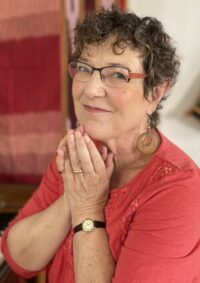 Michele has been involved with music all of her life, and with Balkan folk music for most of it, as a dancer, singer, drummer and teacher. She was raised surrounded by music of all kinds, including classical (especially Bach), standards (especially Margaret Whiting, Frank Sinatra and Ella ), and American folk music. She sang before she talked, played cello and guitar, and most formatively, enjoyed trading harmonies with her mother’s rich alto.
Michele has been involved with music all of her life, and with Balkan folk music for most of it, as a dancer, singer, drummer and teacher. She was raised surrounded by music of all kinds, including classical (especially Bach), standards (especially Margaret Whiting, Frank Sinatra and Ella ), and American folk music. She sang before she talked, played cello and guitar, and most formatively, enjoyed trading harmonies with her mother’s rich alto.
Michele has been inspired by countless musicians, both in the US and abroad, and has been lucky to study with, to name just a few, the late Nadezhda Hvoinova, from the Bulgarian Rhodope region; the late Esma Redzhepova, Queen of Romany music; Serbian folk specialist Svetlana Spajic; Mary Sherhart of Seattle; Jane Sharp of Berkeley; and Bulgarian master singer Tatiana Sarbinska, with whom she also trained as a teacher. Over the last thirty years she has sung with Kitka Women’s Vocal Ensemble, as well as being steeped in the complex odd-metered Balkan dance rhythms, singing and playing percussion in folk dance bands Anoush, Brass Menažeri, Helladelics and Zabava!. She has appeared on recordings and stages across America and in Bulgaria, as well as on Bulgarian and Serbian TV.
Michele teaches private students, workshops, and camps, including the popular Balkan Vocal Technique class that has been a staple at Mendocino Balkan Camp for almost 20 years. As a singing teacher, Michele’s specialty is integrating Balkan vocal styles with American voices. With humor, warmth and patience, she focuses on placement and sound fundamentals, using innovative exercises and imagery, as well as her model skull, Bartholomew.
Michele lives in Oakland, CA and is one of our regular guests at Stockton.
Presentations
Steve Kotansky 💖 Balkan Dance and Culture
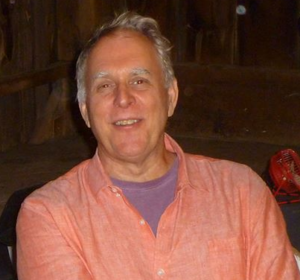 Steve Kotansky was raised in the San Francisco Bay area where he started international folk dancing as a high school student. Besides, regular folk dancing, he performed with the Westwind International Folk Ensemble (North), and the SF Russian Dance Ensemble. In 1970 he made his first research trip to Hungary and former Yugoslavia. He returned to study dance and Slavic Languages at UCLA. While living in Los Angeles, he performed with AMAN Folk Ensemble and Vincent Evanchuk’s Ukrainian dance troupe. He was also a regularly featured teacher at many of the folk dance “cafes” popular in the 1970’s.
Steve Kotansky was raised in the San Francisco Bay area where he started international folk dancing as a high school student. Besides, regular folk dancing, he performed with the Westwind International Folk Ensemble (North), and the SF Russian Dance Ensemble. In 1970 he made his first research trip to Hungary and former Yugoslavia. He returned to study dance and Slavic Languages at UCLA. While living in Los Angeles, he performed with AMAN Folk Ensemble and Vincent Evanchuk’s Ukrainian dance troupe. He was also a regularly featured teacher at many of the folk dance “cafes” popular in the 1970’s.
In 1972, Steve received the “Rubi Vucheta” scholarship to study dance in former Yugoslavia, where he traveled with Robert Leibman recording and filming village dance throughout the country. He remained in Europe, living in Munich, Germany, where he worked with ethnic communities, taught regular classes, organized workshops, and co-founded the GAJDA Folklore Ensemble. He took advantage of his proximity to the Balkans and Eastern Europe, pursuing his study and research of their dance cultures. He taught dance all over Western Europe, choreographed for various groups, and began to organize folk dance workshops and tours to Hungary, Serbia, and Macedonia.
He returned to the U.S.A in 1980 to teach at SFDC as well as most major North America dance camps/weekend workshops. Steve lives in NY with his wife Susan and their two (grown) children. They co-founded the GUZSALY Hungarian Dance Ensemble and have choreographed for many Hungarian and International Dance Ensembles in North America. Steve is know for his passion for dance and extensive knowledge of dances and style of Eastern and South-Eastern European Dance. Currently, he has been teaching dances from Macedonia, Serbia, the Albanian diaspora, Bulgaria, Romania (Csángó), and the Roma populations from these areas.
Ahmet Lüleci 💖 Turkish Dances
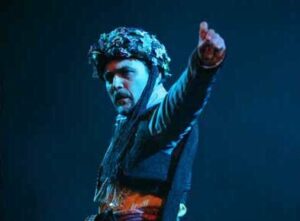 A native of Turkey, Ahmet is an accomplished choreographer, dance teacher and performer as well as a researcher of Anatolian culture. He is currently the artistic director of the Boston based Collage Dance Ensemble, which allows him to further his goal of making folk dance and music accessible to a wider audience.
A native of Turkey, Ahmet is an accomplished choreographer, dance teacher and performer as well as a researcher of Anatolian culture. He is currently the artistic director of the Boston based Collage Dance Ensemble, which allows him to further his goal of making folk dance and music accessible to a wider audience.
He is the winner of Crash Art’s ” Dance Straight Up! 2004 and 2006″, ” Ten’s the limit 2005″ and Boston Dance Umbrella’s ” Boston Moves 2001″ awards for choreography. His choreography set for Budlet dance company won the Gold medal at “Hong Kong open Dance Competition 2004”. He was also recently presented with the 2002 Award for Outstanding Achievement in the Arts & Humanities by ATAA (the Assembly of Turkish American Associations. His company Collage has won the fifth place at the world dance competition in year 2003.
Since arriving in North America in 1985, he has taught many workshops and camps throughout the United States as well as Canada, Japan, Taiwan, Hong Kong, Holland, England, Switzerland, Brazil, Argentina, Germany, Norway, Italy, Spain and Australia. He has set innumerable suites of dances for the stage working with dance organizations around the world.
Some of the notable performing ensembles with whom he has worked include AMAN of Los Angeles, BYU dancers of Provo, BUDLET of Hong Kong, LES SORTILEGES of Montreal, and VINOK of Edmonton. In his native Turkey, he choreographed for HOYTUR and TURHOY of Ankara, ANADOLU UNIVERSITESI of Eskisehir. In 1991 Ahmet joined the Artistic Staff of AMAN as resident choreographer.
From 1974 to 1985, he taught in several excellent ensembles in Ankara, Istanbul, Eskisehir and Bursa. For nearly five years prior to his departure for north America in 1985, Ahmet also served as Director of Dances for HOY-TUR, long considered Turkey’s leading folkdance association. Since the age of eight he has danced with numerous school ensembles and private associations, many of which won outstanding awards in city-wide and National-International competitions. Between 1973 and 2003 he participated in International dance festivals and competitions throughout western and eastern Europe. In edition, he and his ensembles appeared in more than 60 programs broadcast nationally in countries such as Turkey, France, Denmark, the Netherlands, USA, Canada, Brazil and Germany.
His college major was music, specializing in voice. Just as his love of folksongs guided him toward academic study of music, Ahmet’s fascination with dance led him to conduct scholarly research into the historical, social and cultural background of the costumes and spoon dances from Turkey’s Mediterranean coast. His efforts resulted in an exhaustive, 400 page study for which he was awarded First Place in the 1985 national competition in research on the folkdances of Turkey by the Turkish ministry of Youth, Sports, and Education. In 1997 Ahmet completed a second degree in Fine Arts.
He is an adjudicator at the Llangollen International Musical Eisteddfod held yearly in Wales.
He is currently the Artistic Director of Collage Dance Ensemble and served as an International Art Director of “Outside the Box” International Arts Festival in 2015 in Boston.
Richard Powers 💖 Vintage Dances
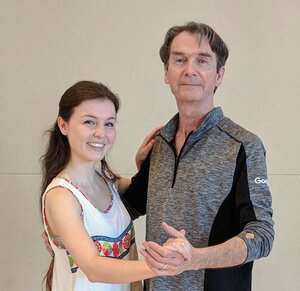 Richard has taught 80 dances at Stockton Camp, and is returning to teach at Stockton for the twelfth time since 1988.
Richard has taught 80 dances at Stockton Camp, and is returning to teach at Stockton for the twelfth time since 1988.
Richard is currently a dance historian and social dance instructor at Stanford University’s Dance Division. His focus since 1975 has been the research and reconstruction of American and European social dance forms, working from a personal collection of over 2,000 historic dance manuals. He is one of the world’s foremost experts in American social dance, noted for his workshops in Paris, Rome, Prague, London, Venice, Vienna, Geneva, Seville, Edinburgh, 22 dance workshops in Russia, and 25 teaching trips to Tokyo, as well as leading workshops across the U.S. and Canada.
Richard has choreographed folk and vintage dance suites for many major companies, including AMAN Folk Ensemble, the Ethnic Dance Theatre of Minneapolis, the BYU Folk Ensemble, Ahmet Lüleci’s Collage Dance Ensemble in Boston, Westwind, the Narodno Folk Dance Ensemble, and the Beseda Dance Theatre in Prague. Richard was recently invited by Buckingham Palace to see the waltz quadrille that he was asked to choreograph for the 200th anniversary of Queen Victoria. Her Majesty Queen Elizabeth commented that she loved it.
Besides Stockton Folk Dance Camp, Richard has taught at many of the major dance workshops and camps, including Mainewoods, Pinewoods, the National Folk Dance Federation of Japan, several of California’s Statewide Festivals, Idyllwild, the Flurry Festival, Texas Camp, Mendocino Folklore Camp, and Buffalo Gap, as well as many regional folk dance groups. During the pandemic, Richard has been busy presenting Zoom lectures for historical dance conferences and organizations in New York, Boston, Seattle, San Francisco, Denver and Bar Harbor, Maine.
Emily Saletan’s biography can be found below as she is also part of this year’s Orkestar Unbound.
Live Music
Bill Cope & Orkestar Unbound 💖 Live Music
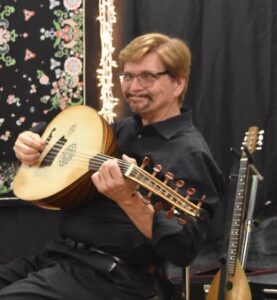 Bill Cope will again put together a world-class band for our January Winter Weekend, and you’ll be seeing Orkestar Unbound in more sessions than our other camps.
Bill Cope will again put together a world-class band for our January Winter Weekend, and you’ll be seeing Orkestar Unbound in more sessions than our other camps.
Personally, Bill is a multi-instrumentalist who does not focus on just one instrument but performs on over 60 in many diverse concert settings. He began playing Balkan music in the mid-1970s after falling in love with the music while part of a dance group based in San Jose, California. He began his teaching career giving lessons on tambura at the Mendocino Balkan Music & Dance workshops in 1982, and to date he has taught at many workshops around the country.
Bill has been the music director of San Francisco-based WestWind International Folk Ensemble, AMAN International Dance Ensemble, Mendocino Folklore Camp, and the San Francisco Kolo Festival. He was the Administrative Director of the East European Folklife Center in the early `990s. He is currently the director of the San Francisco Kolo Festival.
Over the past two years he has ceased to work for technology companies and begun to focus on music. He has been rebuilding his family home in San Jose into a venue for house concerts and an Airbnb for traveling musicians and more than an occasional party! Please see Cope-a-cabana.com for more info!
